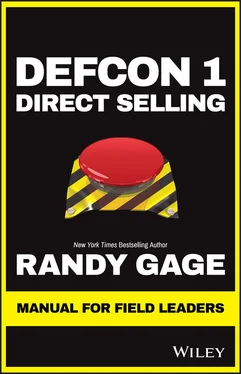Another example is the practice of giving gifts during the holiday season. My recommendation is you set the culture in your team that could include a team-wide celebration and well wishes, but no exchange of gifts. This might appear counterintuitive to you, as it does to many people. Leaders love the idea of giving gifts of business or personal development items, as doing so seems inspirational and congruent with the philosophy of growth in the business. But once again, there could be stress points.
Someone just working their way up through the comp plan could be at a level where they have 80 or 100 members on their team and are reinvesting all they earn back into the business (buying recruiting tools, building long-distance lines, etc.). If they want to buy gifts for everyone, it could require going into debt, which would not be prudent.
There are people I respect who have a culture of gift giving, considering this integral to relationship building, showing appreciation, and creating loyalty. They have systemized the process, including team guidelines on who you give a gift to and how much to spend. If you’re going to have a culture of gift giving, be sure and follow their example.
As you can see, some practices look benign on the surface but end up backfiring in the important area of duplicability. Begin by leading yourself, then filter everything through the lens of how it will affect the people many levels below you. Once you’ve made this commitment to the success of those you sponsor and worked to ensure that the infrastructure and team practices promote duplicability, you have to do something unusual in business (and even relationships) today…
Care Enough About Your People to be a Truth Teller
If you read my last book, you know I make two promises to everyone I enroll:
1 I will never knowingly lie to them.
2 I will never knowingly tell them something that is not in the best interests of their business.
But being a truth teller goes much further. It means you respect people enough that you don’t pander to them or just tell them what they want to hear. Nothing is more harmful to a person’s growth and development than having coaches or mentors who only compliment and indulge them with “happy talk” and don’t keep their guidance grounded in reality. Most of us have surrounded ourselves with people who give us permission to stay the same. We all need people in our lives who love and respect us for who we are—yet also challenge us to become better versions of ourselves.
Let me share a story from early in my career about the first time I met some people high up in my sponsorship line, a couple who were one of the top-earning distributorships in the world. They told me something that devastated me—and ultimately created one of the biggest breakthroughs in my life.
That couple was Spencer and Shivani Poch. They lived in Sacramento, with a team that spanned all around the country. I was in Miami, hundreds of levels down in their organization. They had heard about a training I was conducting for my team and asked if I would be willing to come to California and present it to their group there. Of course, this was the highest honor they could bestow upon me, elevating and edifying me on their stage. I eagerly jumped at the opportunity.
The evening before the event, they graciously took me out for dinner, so we could get to know each other. I was starstruck just spending time with them, eager to impress them with my work ethic, tenacity, and desire to become successful. I did what I always did in those days: regale them with story after story of the trauma, drama, and victimhood in my life.
I explained what a loser my own sponsor was and how much harder I had to work because of him. I spoke about the guy who had his credit card declined for his order on the last day of the month, which meant he didn’t qualify for a rank, which in turn made me unqualified for my rank and cost me a lot of commissions. (There was no Internet then. You didn’t know your actual sales and rank until two weeks later, when the checks were issued.) I complained about all the lazy ignorant people in my team, my health challenges, my dysfunctional relationships, and all of the other unfair things the universe was assaulting me with at that point in my life.
Looking back on that dinner now, I can recognize my whining for what it truly was: working my fulltime job as a professional victim. This whole story was an almost prerecorded “data dump” I did anytime I talked about myself. It was my desperate subconscious attempt to feel worthy, just an innocent victim fighting the forces of evil. I had zero awareness of this at the time of our dinner in California.
I thought I was just explaining why all of the bad things that happened to me weren’t my fault, that I was simply a very unlucky person the universe was conspiring against. I was quite sure Spence and Shivani were duly impressed with my strength and resilience. Until we were getting into the car after the dinner.
Just before we climbed into the car, Spence looked at me and asked quietly, “Randy, have you given any thought to what you might be doing to attract all of these bad things in your life?”
I was perplexed. Which quickly escalated to apoplectic. My mind began racing… Did he not hear everything I had just told him? Was he not listening? Was he just a cold-hearted sonofabitch?
I’m not sure what I mumbled back, but I’m sure it showed I wasn’t buying into his woo-woo, New-Age thinking. I did the training the next day and returned home. But that question had me grinding my molars for the next few weeks. My thoughts swirled, collided, detonated, and ultimately left me dazed. Wasn’t I simply an innocent victim? Could I really be somehow attracting those calamities into my life? Spencer’s question forced me into deep introspection. This finally led to my asking myself the most important question I have ever asked myself. As I reflected on my many health challenges, business failures, and dysfunctional relationships, I asked:
Was there one person who was always at the scene of the crime?
I didn’t like the answer I got. But that answer was what liberated me from lack and limitation. It meant taking personal responsibility, and instead of thinking of myself as a recipient in my life, seeing myself as a co- creator. I realized that I had lived in a victimhood mindset my entire existence up until that moment of clarity. And that if I wanted things to change, I would have to change.
I stopped looking at external, outside factors, and began to think about the internal, inside ones.
Now, decades later, I can still look back to that simple question Spence had asked me and recognize it as a seminal moment in my life, one that started my transformation and turned things around for me. And that was all because instead of pandering to me, he cared enough about me to be brutally honest—to be a truth teller. And there is no greater gift you can give the people on your team, especially the ones you enroll personally. Be that truth teller.
Another vital part of your responsibility as a truth teller is to be honest with yourself as well. People need leaders who are rational, realistic, and cognizant of their own strengths and weaknesses. My breakthrough came when I looked at my situation: numerous health challenges, business failures, and negative, dysfunctional relationships. I certainly met the first of the criteria from von Mises that we discussed in Chapter 1: I was dissatisfied.
Changing your behavior in an area requires doing the introspection to recognize that you are dissatisfied with your current situation, then creating a compelling vision of something better. You need a vision magnetic enough to pull you toward it. Then it gets harder.
Читать дальше












